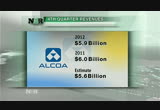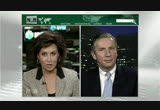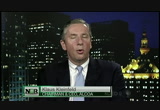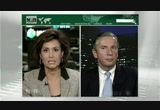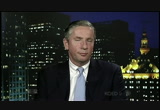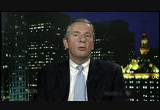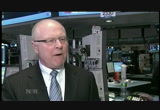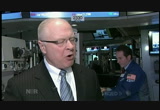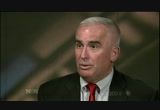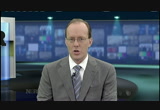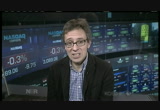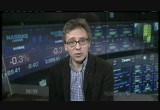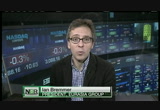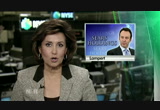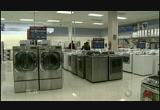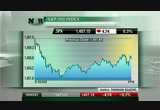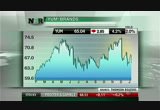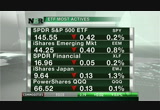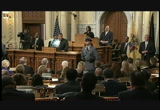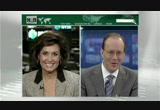tv Nightly Business Report PBS January 8, 2013 7:00pm-7:30pm PST
7:00 pm
that was right in line with analyst estimates. revenues came in stronger than expected at nearly $6 billion, but they were down a bit from a year ago. alcoa is the first dow component to report earnings, and the stock rose more than 1.5% in after hours trading. on wall street, worries about earnings season took stocks lower for a second straight session. adding to the dow's losses, a big drop in boeing shares. we'll have more on that in tonight's "market focus." the dow fell 55 points, the nasdaq lost seven, the s&p was down nearly five points.
7:01 pm
happening with the new government being there. europe -- in fact, i think it is a surprise for many because it is muddling through, and it will probably continue to muddle through for a while. but it has been muddling through okay. one of the indicators that always use is italy interest rates, and the 10-year bond rates. the beginning of last year, almost 7%. end of last year, 4 and change. and the u.s. -- we have seen some growth in the u.s. last year, and we believe we have, if we avoid to hit the fiscal ceiling, the debt ceiling -- if we avoid that, we have it in our hands, and we can generate positive growth. we are seeing some good indications in the markets that have pretty much the debt here in the u.s. the building and construction market. for four years it has been dead. now suddenly we see it is coming back to life. this will only be coming back to life if we send
7:02 pm
strong comfortable messages and not have a discussion about the fiscal cliff and now the debt ceiling and then probably the next one. we need to continue to generate confidence. and if we do that, i think we will have nice markets here, automotive being one of those in the u.s. aerospace, very important. we could see, also a rebound in the building and construction market. >> susie: you mentioned the word confidence, and the word that we mostly hear from any business companies, they use the word concern. you've heard this all the time. how does that impact alcoa. how does it impact your order? >> well, it impacts them -- for instance, let's go to the smaller medium business owners in the truck business. all right? where we saw they have pretty much been cancelling orders in the last year, and it has been coming down. there was a little blip in the fourth quarter because they saw the tax credits would be running out, and that's why they ordered
7:03 pm
again. but i saw people reading the news and watching tv, and they ask themselves, do i invest in my business or do i not? the average age of the fleet that they hold is older than it ever was. 11 years to date, whereas the average is 9.8 or so, the 20-year average. the freight miles are up, and the prices are up, so everything speaks for investing for them. but if you are in that position, you say, hey, do i invest now or run the truck for another year? probably if you hear all of this negative news or all this uncertainty, you probably stop it. that's a fact for everybody. so it is so important to find a solution. >> susie: how does it affect you, as a c.e.o., in terms of the plans that you're making. you're looking ahead to the year 2013. how does the uncertainty -- and you mentioned the debt talks in washington, not knowing what is going to happen in washington, what are you doing differently?
7:04 pm
>> what you have to do is you have to basically prepare for flexibility. we have seen, already in the last years, we have been managing the crisis extremely well. you saw it again in this quarter. you saw it in the whole year. extremely solid performance on the -- a strong performance on the cash generation side. good performance on the earnings and solid revenue. that's what you have to prepare for. you have the use every lever to make sure you have a strong balance sheet and that you can manage in a very, very fast section, and stay flexible. that's what our 60,000 employees in alcoa have shown. we are prepared to use the opportunities that come up. i hope there will be quite a number of opportunities. at the same time, we do it in a way we continue to have a strong balance sheet and continue to generate cash. >> susie: all right, talking about cash and your strong balance sheet, you have about $2 billion of cash. we hear a lot about how companies are sitting on a
7:05 pm
pile of cash and really not doing much with it. what can we expect alcoa to do with that $2 million, maybe not all of it, but some of it. >> we already are doing something. we are using opportunities. automotive we talked about. in general, that is exciting. specifically for an aluminum company is exciting. because we see here in the u.s. with a new emission regulation, people are going for lightweighting. they replace steel with aluminum, which is good for us. we put our money behind that, and expanding in davenport and building an automotive company in davenport. and the second thing is aerospace. we come out with a new alloy, called aluminum lithium, and we're putting our money behind there and making a cast house. we currently have a small one, and we built a bigger one. so this is what is happening. at the same time, i mean there are some industries that we're restructuring. that's just the normal course of business. but the opportunities are,
7:06 pm
we're putting our money behind it. >> susie: it sounds really encouraging to hear that that money is being put to use into our economy. that is refreshing. take so much, clau klaus kleinfeld. thank you so much. c.e.o. klaus kleinfeld. >> tom: still ahead, we go beyond the scoreboard with an unlikely winner in the fiscal cliff debate: nascar racetrack owners. >> tom: today, it was concerns about earnings. last month, it was the fiscal cliff. a year ago, it was europe. the long list of concerns have scared small investors away from the stock market. as a result, many missed out on last year's 13% gain in the s&p 500. suzanne pratt looks tonight at what it might take to turn retail investors into stock shareholders again. >> reporter: where is everybody? we're not talking about the growth in electronic trading that has made the big board's floor seem so lonely. we're talking retail investors, so many of whom have exited the
7:07 pm
stock market in the last several years. t.d. ameritrade and its c.e.o. fred tomczyk keep close tabs on the psyche of american investors and have a theory. >> i think it's definitely uncertainty and all the events that have happened over the last couple of years. i think, if there's one thing to turn it around, it would be seeing more indications that the u.s. economy is on the right track. >> reporter: to better gauge investor sentiment, ameritrade today launched a behavior-based index that tracks its customers actual buying and selling. you probably tested it already. what is it telling you? >> it would tell you that most retail investors were getting more bullish, and that they were dismissing that there was going to be the end of the world here, and that they were getting comfortable with the u.s. economy continuing to show good signs. and so, they were turning more bullish, relatively more bullish. >> reporter: more bullish? maybe, but will they actually
7:08 pm
buy stocks this year? data show the percentage of u.s. households that hold domestic equities either directly or through mutual funds has fallen to 46.4%. just a decade ago, 53% of households were invested in stocks or stock funds. >> i do think they will come back into the market this year. i've said that since the beginning, however, that doesn't mean it can't come derailed if our federal government doesn't do the proper things here in the next while. >> reporter: the one concern for tomczyk is bonds. after all, while shunning equities, investors have had a passionate love affair with bonds. >> the thing that worries me the most is people that are invested or stretching for yields and actually going long bonds or long bond funds because i don't think they may or may not understand what happens when the yield curve starts to steepen and interest rates start to rise. >> reporter: what happens, of course, is they lose money. maybe that would send at least some investors back into stocks.
7:09 pm
suzanne pratt, "n.b.r.," new york. >> susie: chuck hagel, the man president obama has nominated to lead the defense department, has called the pentagon bloated and warned the agency has not made important strategic decisions. his nomination comes as lawmakers have been looking at taking a trillion out of defense spending over the coming decade. but as darren gersh reports, hagel may be forced to cut a lot more than that. >> reporter: former senator chuck hagel is a vietnam vet, so when he accepted the
7:10 pm
president's nomination as secretary of defense, it was fitting his thoughts turned first to the troops. >> these are people who give so much to this nation everyday with such dignity and selflessness. >> reporter: but if he is confirmed, one of hagel's toughest jobs will be deciding how much to cut back the size of the military and the size of military paychecks. that won't be easy. >> despite all the conspiracy theories about the defense industry, it's actually a lot easier to cut weapons than to cut personnel costs. when you try to cut military pay and benefits, you run into a buzzsaw on capitol hill. >> reporter: if you count benefits like tax-free cash allowances for housing and food, most service members now make more than civilians with similar levels of education and experience. the obama administration has already used up the easiest savings in the defense budget, but it hasn't taken on personnel costs. as a veteran and a former head of the u.s.o., hagel might have the clout to bring military pay raises in line with what's happening in the rest of the economy.
7:11 pm
>> and when people talk about, oh, what the impact of this or that on military families, "you say, wait a second, i saved the u.s.o. from bankruptcy. so i know military families." and so, i think that is one area he can work on that has been politically toxic for any of his predecessors. >> reporter: there are still big savings to be found in cutting weapons systems-- in particular, the nation's nuclear arsenal. reducing the number of nuclear submarines, bombers and missiles could cut the defense budget by $10 billion a year. and a republican secretary of defense may give the president additional cover to seek those cuts, which is why defense companies are worried. >> the defense industry understands that military budgets are going to continue to be cut until a new threat comes along. what they want, to borrow a phrase from president obama, is some balance where all the cuts don't come out of weapons. >> reporter: if balance means
7:12 pm
trimming military personnel costs, hagel will have to sell it with his former colleagues on capitol hill. that means explaining why it's now a good idea to cut back the kind of military pay raises hagel supported when he was in the senate. darren gersh, "n.b.r.," washington. >> well, job growth here in the u.s. is best described as modest. there are at least new jobs being created each month. the same cannot be said in europe. another 113,000 people lost jobs in november, pushing the unemployment rate up to a new high. new figures have the e.u.'s jobless rate hitting 11.8%, 18.8 million people going without work. the highest is in spain, where a quarter of its working population is unemployed. youth unemployment is at a record high, and exports from germany and france are falling. it is among the top risks for investors here.
7:13 pm
ian, happy new year. we have seen u.s. stock prices climb to five-year heights, despite the risks in europe. are the risks getting more pronounced for global investors? >> no. the risks are overplayed. people have been concerned about the likelihood the eurozone was going to fall apart. you only had to have a economist description last year. i think they ran eight different cover stories, showing the euro either blowing up or breaking apart or bursting into flames. not going to happen. no greek exit. no anybody else exit. but the austerity that is hitting, and hitting hard, precisely because the germans are trying to create fiscal union, and ultimately more accountability for the budgets of these peripheral countries, is hurting pretty bad. europe, you're definitely going to see significant continued pain across the eurozone, but the downside is not what people thought it was. and, frankly, that's going
7:14 pm
to slow progress because the markets won't put as much pressure on the eurozone and the bonds on these countries. >> tom: let's go from europe to emerging markets. i want to present some data from the i.m.f., forecasting the advanced economies growing at 1.5%, and emerging markets at over 5%. what are emerging markets your top risk then? >> emerging markets shouldn't be treated as a single asset class. some are increasingly developing, and as a kwon conconsequence great places to be, like turkey and brazil. and they have a downside, particularly in a global economy not being led by the united states. not a singular globalization. some of those countries will have much slower years than they had before. i'm thinking about india. some of those countries
7:15 pm
will grow quickly, but they will have much more conflict with foreign nations, and investing will be much more dangerous. here i'm thinking about china, and some of the emerging markets don't deserve to be called emerging. the they should be called sub merging. in particular, i'm thinking about russia. two-thirds of the worlds economic growth comes from emerging markets, and yet they are manage more volatile and unstable. >> i have to mention the united states bu the u.s. appears on your list of global worries. even after we address the tax cuts and the fiscal cliff? >> less worrisome, but less worrisome in the united states is the housing structure, and we've got stock markets doing relatively well, and we have a massive energy boom we're just in the beginnings of. but washington politics are toxic and getting worse. the debt limit and the frustration will be harder
7:16 pm
to deal with than the fiscal cliff. as a consequence, the politics in the united states will create some downside. we're not talking about a recession, but numbers in the u.s. could be even better if it weren't for washington looking so dysfunctional. >> tom: that drag of dysfunction in politics. ian bremmer along with us. thank you. >> susie: a big management change at sears: c.e.o. lou d'ambrosio is stepping down in february after less than two years on the job. replacing him: the company's chairman, hedge fund manager eddie lampert. as ruben ramirez reports,
7:17 pm
lampert's priorities may take sears in a different direction. >> reporter: the revolving door in the c-suite at sears continues. sears chairman eddie lampert will be the new c.e.o. of the company his hedge fund took over in 2005. appel associates president michael appel says whoever ends up running the company will need to have retail in their blood. >> at the end of the day, retail businesses are in the business of selling merchandise, and the merchandise thrust and vision for those businesses usually comes from that merchant c.e.o. >> reporter: appel says that's not lampert's strong suit. sears' sales have declined for five consecutive years as it has struggled against competitors like home depot, target and wal- mart. the downturn in the housing market hasn't helped. about 40% of sears' sales come from its tools and appliance businesses. 2012 was a roller coaster ride for sears investors. the shares shot up in the first part of the year and are now hovering in the $40 range.
7:18 pm
>> it's more a bet on the financial engineering skills of eddie lampert. and what his future plans are, that's up for anybody to decide. but it looks like, with him taking the reigns of the company, it's more going to be a breakup mode right now for sears. >> reporter: hartzell says the likeliest bet is lambert will try and sell-off some of sears' most well-known brands like lands end and kenmore. and he says don't forget the retailer's home appliance repair business, where margins are high. ruben ramirez, "n.b.r.," new york. >> tom: stocks eased lower today for the second session in a row. it wasn't a dramatic move with the s&p 500 trading in a ten- point range with trader focus falling on quarterly earnings and forecasts. the index pared back earlier losses to end lower by just 0.3%. trading volume was 691 million
7:19 pm
shares on the big board and 1.75 billion on the nasdaq. the telecommunications sector saw the heaviest selling, falling 2.7%. the industrial sector was down 0.8%. now, it was the big phone stocks weighing on the telecom sector with both a.t.&t. and verizon falling with heavier than usual volume. verizon dropped 2.4%. the c.e.o. acknowledged that the company could buy out its verizon wireless partner, vodaphone. a.t.&t. fell 1.7%. it sold more than ten million smartphones in the fourth quarter. that's a new record. boeing weighed on the market, pushing shares lower over worries with boeing's new dreamliner 787 plane. first, national transportation safety board officials are investigating an onboard fire on a dreamliner yesterday at logan airport in boston. that fire had carriers inspecting their 787s, and united airlines found improperly installed wiring according to reports. the "wall street journal" reports both issues center around the plane's auxiliary
7:20 pm
power system. shares fell 2.6% on heavy volume. the company is increasing production of the dreamliner, aiming to boost its delivery of the planes. almost 800 of them have been ordered by air carriers around the world. videogame retailer game stop may want a reset for the past holiday season. the company warned sales at stores open for at least a year fell, forcing the company to cut the top end of its financial forecast for the quarter. traders and investors hit the sell button. shares fell 6.3% on heavy volume. sales dropped for both new and used video games. we have more analysis of game stop's stock chart on our web site, www.nbr.com. under the "blogs" tab is where you will find michael kahn's technical analysis blog. game stop wasn't alone in warning about its quarterly financial report card. yum brands, the company behind k.f.c., now expects same-store sales in china to fall more than anticipated. it blames a chinese government review of its chicken supplies.
7:21 pm
shares dropped 4.2%. two companies missing their earnings estimates and disappointing the market. schnitzer steel lost money thanks to weaker revenue. shares fell 7.9%. lighting company acuity brands saw its profit margins pinched by higher costs. shares dropped 5.1%. but agriculture supply company monsanto saw its first quarter earnings soar thanks to corn seed sales in south america and higher prices for herbicide. the optimism continues as the company raised its full year guidance. that helped shares grow up 2.7%. volume was heavy with shares at a four and a half year high. all five most actively traded exchange traded products were down. the japanese e.t.f. led the losers, falling 1.3%. and that's tonight's "market focus."
7:22 pm
>> susie: an update tonight on the cost of hurricane sandy. fitch ratings says the super storm has so far caused as much as $17 billion in reported losses. by the time the recovery is over, fitch expects sandy's cost to top $20 billion. new jersey is one of the states hit hardest, and, today, governor chris christie talked about the storm's toll on his state's economy. >> there's no question that sandy hit us hard. there's also no question that we're fighting back with everything we've got. sandy took a toll on new jersey's economy just when we were coming back from a national recession. sandy disrupted our economic life. cars weren't bought, homes weren't sold and factories couldn't produce. from those things, we can catch
7:23 pm
up, and we are catching up. make no mistake-- as common sense would tell you, sandy hurt new jersey's economy. >> susie: christie today pledged to devote the final year of his first term in office to rebuilding and reinvigorating areas of the state devastated by hurricane sandy. >> tom: as the drama over the fiscal cliff played out in washington, car racing may have been the last thing you were thinking about. but as rick horrow explains in tonight's "beyond the scoreboard," the fiscal cliff deal as very good for nascar racetrack owners. >> arguably one of the biggest winners in the recent fiscal cliff tax deal is nascar track owners. included in the compromise is a measure allowing track owners like international speedway to accelerate their depreciation expenses, thus reducing the taxes they pay. the so-called "nascar loophole" saves track owners $46 million this year and $95 million through 2017. the "nascar loophole" originally was enacted in 2004, and, since that time, track owners have
7:24 pm
spent hundreds of thousands of dollars lobbying congress to keep it. they argue that lowering their tax burden helps to improve the fan experience at races. while that might be true, it's still a zero-sum game. $95 million in tax breaks for racetracks means $95 million in lost revenue for the government and taxpayers. but it also means better quarterly and annual earnings for international speedway corp. and speedway motorsports, the two biggest publicly-traded track owners. both stocks ran up to multi- month highs when the fiscal cliff deal, and the continuation of their tax loop-holes, crossed the finish line. i'm rick horrow. on other issues facing investors. when he comes out with his report. >> tom: he hasn't steered entirely away from it. >> that's going to be a tough one.
7:25 pm
7:29 pm
brenda wong aoki's ancestors were spanish, jap knees and scottish. >> mama was on the travel school. >> she's here with gayle ross. a descendent of john ross. >> there she was, running the fry bread booth, or running the whole show. >> they come from cultures worlds apart. but share a lifelong passion of telling stories. we profiled gifted storytellers like brenda and gayle who lead a worldwide revival.
148 Views
IN COLLECTIONS
KQED (PBS) Television Archive
Television Archive  Television Archive News Search Service
Television Archive News Search Service 
Uploaded by TV Archive on

 Live Music Archive
Live Music Archive Librivox Free Audio
Librivox Free Audio Metropolitan Museum
Metropolitan Museum Cleveland Museum of Art
Cleveland Museum of Art Internet Arcade
Internet Arcade Console Living Room
Console Living Room Books to Borrow
Books to Borrow Open Library
Open Library TV News
TV News Understanding 9/11
Understanding 9/11